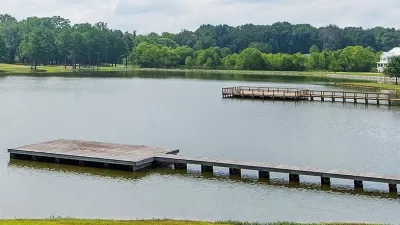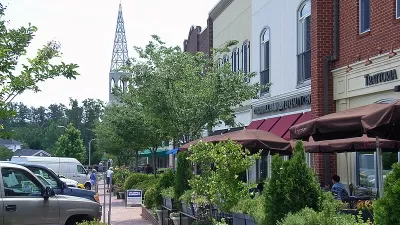Galina Tachieva's new Sprawl Repair Manual creates a narrative and visual process for making suburbs more sustainable. The book's first chapter is available now online.
Tachieva explains what she sees as sprawl:
"Sprawl is a pattern of growth characterized by an abundance of congested highways, strip shopping centers, big boxes, office parks, and gated cul-de-sac subdivisions-all separated from each other in isolated, single-use pods. This land-use pattern is typically found in suburban areas, but also affects our cities, and is central to our wasteful use of water, energy, land, and time spent in traffic. Sprawl has been linked to increased air and water pollution, greenhouse gas emissions, loss of open space and natural habitat, and the exponential increase in new infrastructure costs. Social problems related to the lack of diversity have been attributed to sprawl, and health problems such as obesity to its auto-dependence.
In contrast, complete communities have a mix of uses and are walkable, with many of a person's daily need-shops, offices, transit, civic and recreational places-within a short distance of home. They are compact, so they consume less open space and enable multiple modes of transportation, including bicycles, cars, and mass transit. A wide variety of building types provides options to residents and businesses, encouraging diversity in population. This mix of uses, public spaces, transportation, and population makes complete communities economically, socially, and environmentally sustainable."
Thanks to Simmons Buntin
FULL STORY: Sprawl Repair: From Sprawl to Complete Communities

Planetizen Federal Action Tracker
A weekly monitor of how Trump’s orders and actions are impacting planners and planning in America.

Congressman Proposes Bill to Rename DC Metro “Trump Train”
The Make Autorail Great Again Act would withhold federal funding to the system until the Washington Metropolitan Area Transit Authority (WMATA), rebrands as the Washington Metropolitan Authority for Greater Access (WMAGA).

The Simple Legislative Tool Transforming Vacant Downtowns
In California, Michigan and Georgia, an easy win is bringing dollars — and delight — back to city centers.

The Small South Asian Republic Going all in on EVs
Thanks to one simple policy change less than five years ago, 65% of new cars in this Himalayan country are now electric.

DC Backpedals on Bike Lane Protection, Swaps Barriers for Paint
Citing aesthetic concerns, the city is removing the concrete barriers and flexposts that once separated Arizona Avenue cyclists from motor vehicles.

In These Cities, Most New Housing is Under 441 Square Feet
With loosened restrictions on “micro-housing,” tiny units now make up as much as 66% of newly constructed housing.
Urban Design for Planners 1: Software Tools
This six-course series explores essential urban design concepts using open source software and equips planners with the tools they need to participate fully in the urban design process.
Planning for Universal Design
Learn the tools for implementing Universal Design in planning regulations.
Smith Gee Studio
City of Charlotte
City of Camden Redevelopment Agency
City of Astoria
Transportation Research & Education Center (TREC) at Portland State University
US High Speed Rail Association
City of Camden Redevelopment Agency
Municipality of Princeton (NJ)





























